Share this Post
In a world that seems increasingly dominated by large, international companies like Amazon, Google, and Facebook, one would be forgiven for making the assumption that it’s these deep-pocketed behemoths that form the backbone of the global economy. Nothing could be further from the truth. In reality, it’s your friendly, familiar, and trusted family-owned businesses that are the true economic powerhouses, driving economies at the local, national, and global level.
Coming in all shapes and sizes, global survey data collected by KPMG reveals that family businesses produce more than 75% of GDP in most countries worldwide, and employ 75% of the global workforce.
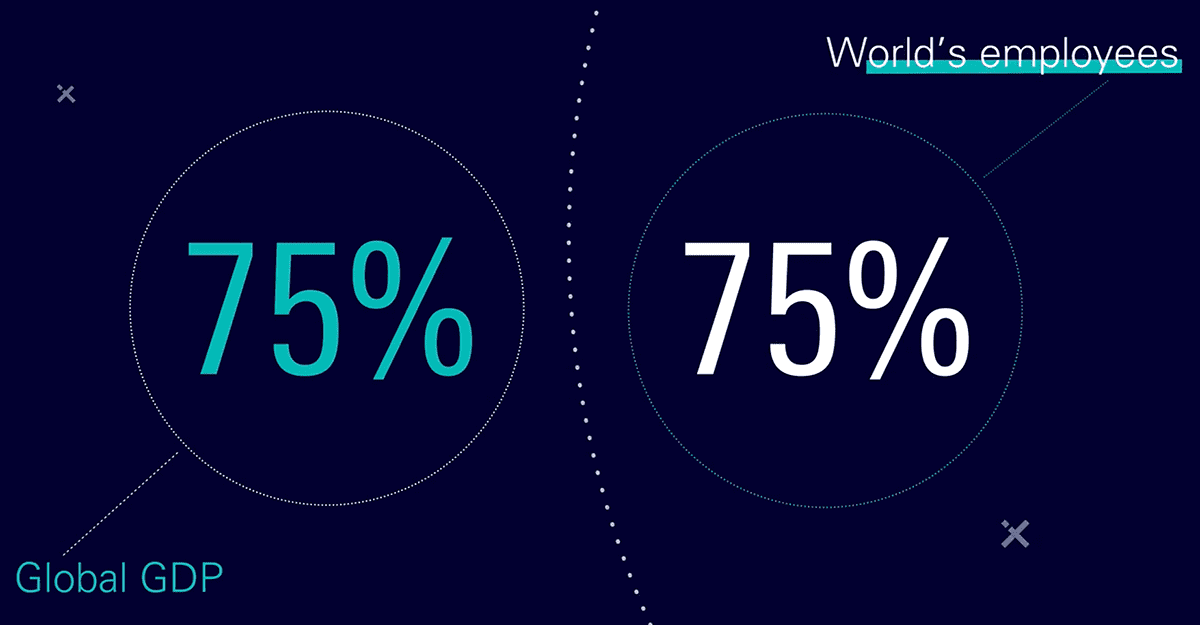
Family businesses are leading a global economic recovery. —Source: home.kpmg
The report, titled Mastering a Comeback: How Family Businesses Are Triumphing Over COVID-19, demonstrates that not only is it family businesses that have been the driving force of economies all over the world for many, many generations, but that, due to their long-term mindset and deep-seated resilience during the pandemic, it’s these same family businesses that will play a key role in leading the global economic recovery.
Masters of Their Own Recovery
To be sure, family businesses took a significant financial hit throughout the crisis. Globally, 69% reported that COVID-19 resulted in revenue decline, leaving three-quarters (76%) making use of government support programs, primarily in the form of low-cost loan arrangements.
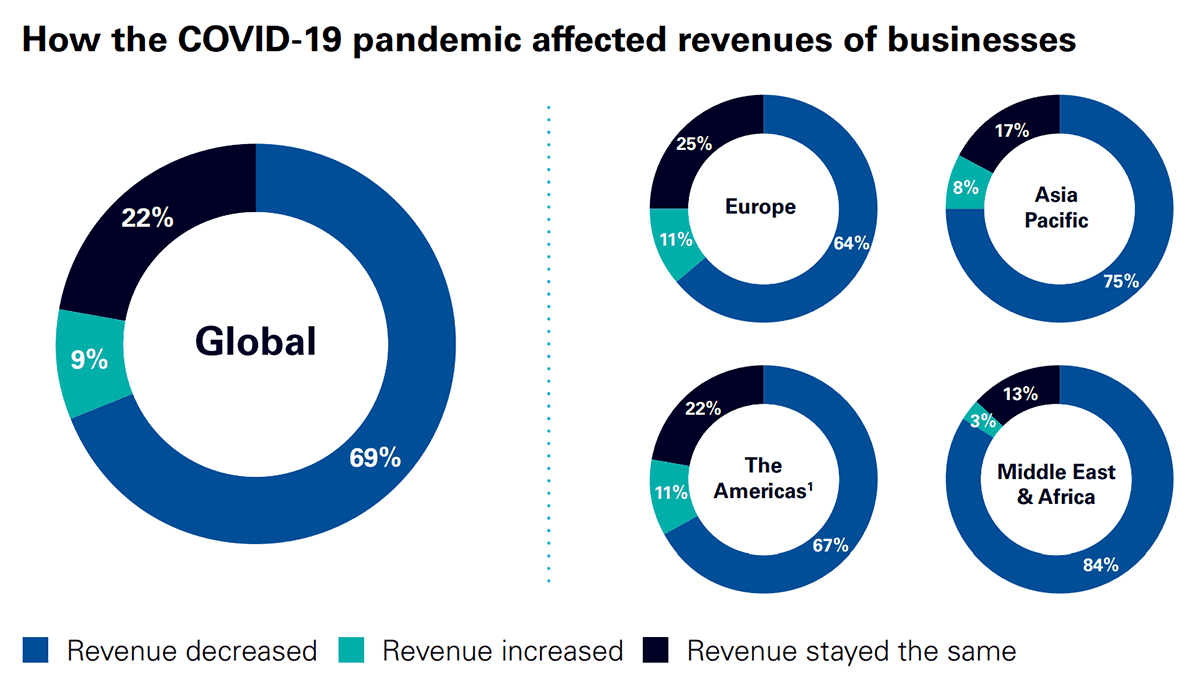
How the COVID-19 pandemic affected revenues of businesses. —Source: home.kpmg
However, the report also reveals that family businesses were able to successfully stabilize their business in the short term in response to the direct impact of COVID-19, while leveraging their entrepreneurial mindset to sustain a sharp focus on longer-term prospects. As the report states, many “succeeded in opening up opportunities to adopt innovative technologies, develop new products and tap into emerging new markets.”
How did they do it? Evaluating the actions taken by family businesses, the report reveals three core strategic responses to address the immediate impact of COVID-19:
- Exercising patience: Family businesses are focused on protecting their succession plans and long-term future for the next generation. This long-term mindset has enabled them to leverage their patient capital to understand the full impact of COVID-19 on their business and others in their industry, with a view to adopting plans for the long term, rather than just mitigating the short-term impact of the pandemic.
- Social responsibility: They took steps to address the impact of the pandemic not only on their family and business, but on the welfare of society, and the needs of all their stakeholders including employees, customers, suppliers and local communities.
- Business transformation: Family businesses were found to be 42% more likely to implement business transformation strategies than non-family businesses during the pandemic. Specifically, many took the time to look seriously at ways to streamline their operations by accelerating the implementation of new digital solutions.
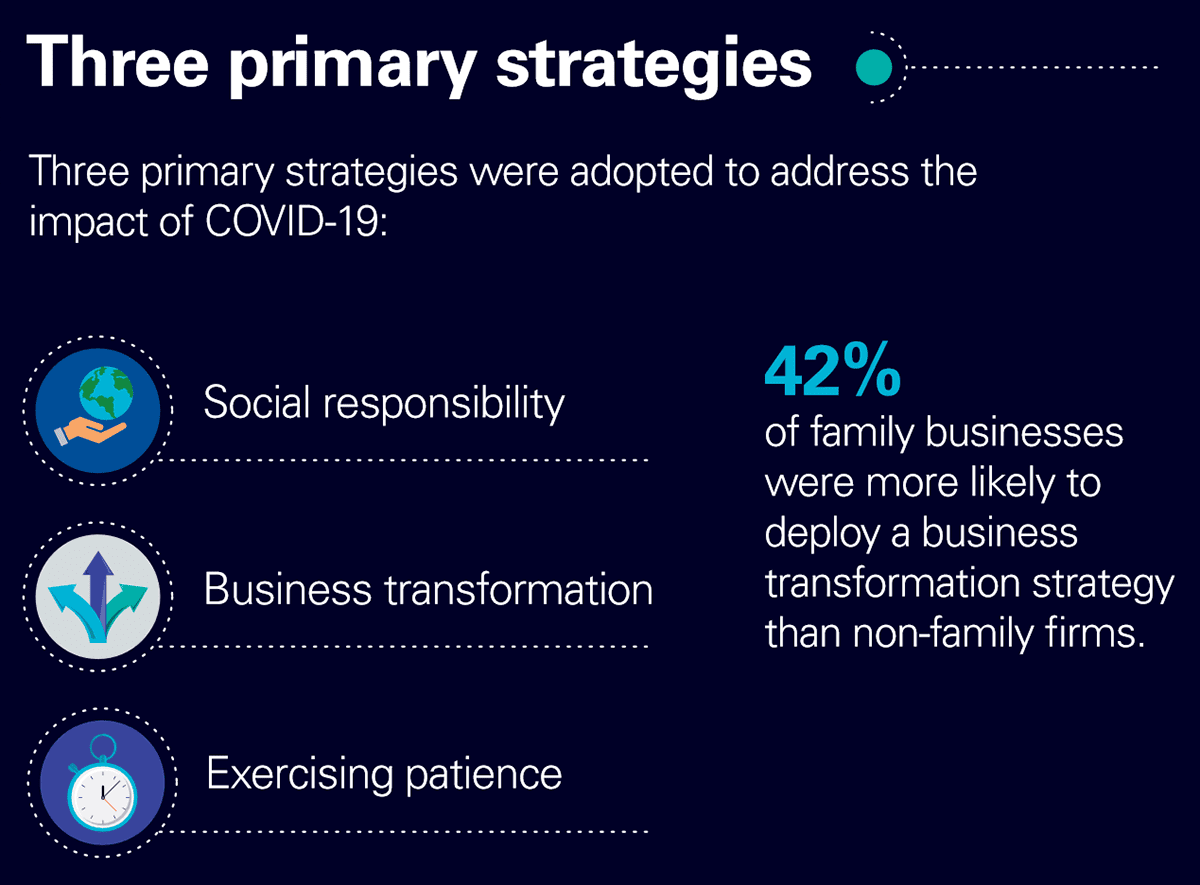
Three primary strategies were adopted to address the impact of COVID-19. —Source: home.kpmg
Business transformation was of particular importance to weather the COVID storm for family businesses — and the decisions taken are also laying the foundation for their companies’ longer-term growth strategies. “These decisions,” the report says, “have led to a complete transformation of business operating models and product offerings, with the intent of making them fit for purpose in the new digital age.”
For example, the need for faster and better communications technology for remote work environments and inter-personal communications led many family businesses to accelerate the digitalisation of their business models. Perhaps unsurprisingly, due to their knowledge of and exposure to new technologies, it was largely younger generations of the family that were tasked with identifying digital solutions to transform the family’s business operations or helping to develop new technology-based service offerings that can accelerate the business into the future.
“In many cases I don’t believe that the pandemic has changed family business strategies as much as it has accelerated the implementation of some strategies or amplified the family’s position on changes that they were already considering,” observes Dr. Knut Tonne, Partner, KPMG Private Enterprise, KPMG Germany, in the report. “With more companies looking at the technology infrastructure of their firms and the acceleration of the new digital economy, encouraging greater involvement of younger generation family members may be one of the most important short-term actions family businesses can take.”
Expanding Online
The multi-generational impact on digital transformation was indeed observed in the survey’s findings — family businesses that have several generations of the family involved in the business were 45% more likely to deploy a transformation strategy compared to single-generation firms.
The truth, however, is that all family businesses must now embrace digital transformation to keep pace with accelerating market expectations. Family businesses that have been happily operating offline for years may until now have been reluctant to digitize. However, the pandemic has accelerated the oncoming of the digital age. With stay-at-home orders in place around the globe, ecommerce sales grew two to five times faster than before the pandemic as consumers switched to online shopping, according to McKinsey.
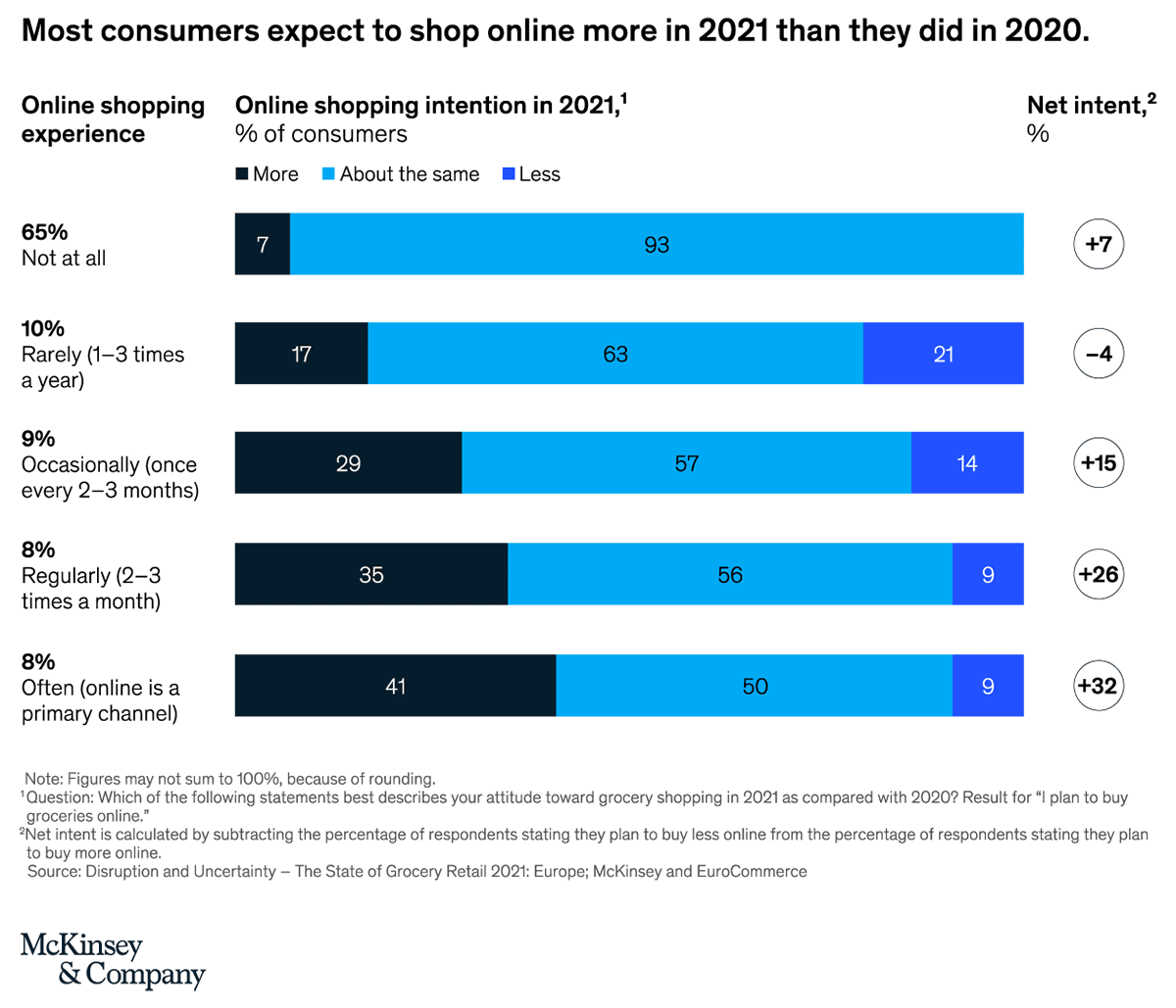
Consumers are eager to make even more of their purchases online in 2021. —Source: mckinsey.com
A new report from Checkout.com — based on the views of 10,000 European consumers and 550 senior ecommerce executives — reveals that the shift to ecommerce is here to stay. The research reveals that across Europe, three-quarters (74%) of consumers have no intention to significantly reduce their online shopping now that they can revisit the high street. A third (37%) said that increased online shopping has made their lives easier and more secure, while almost one in ten (8%) plan to never return to brick-and-mortar shopping again if they can help it.
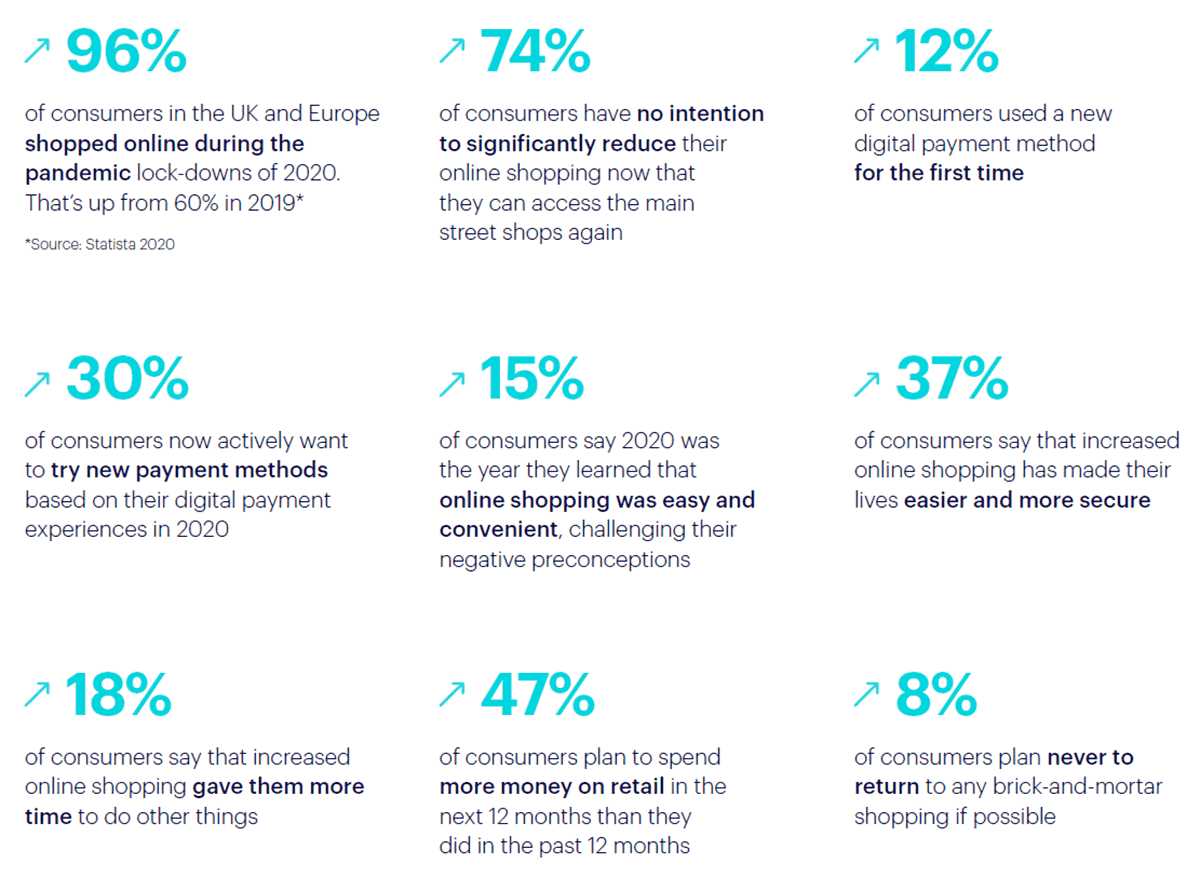
European ecommerce boom is set to stick and grow. —Source: checkout.com
As ecommerce sales, order values, and ecommerce site visits all rise in line with these trends, existing ecommerce merchants are already innovating to stay one step ahead. 50% said that the pandemic put serious pressure on their services, forcing them to rapidly improve operations — while 95% said that they need to innovate now to maintain the advantage gained during the pandemic.
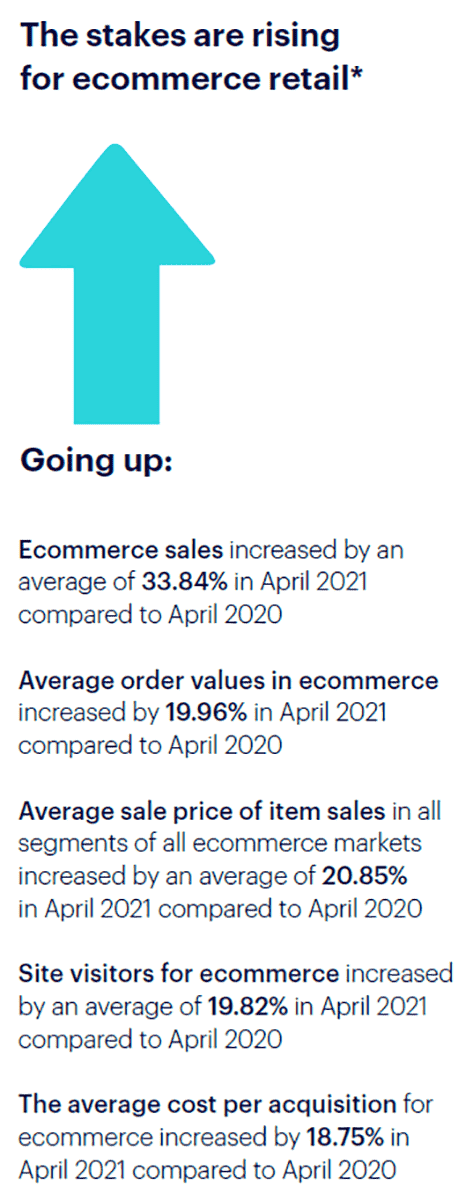
The stakes are rising for ecommerce retail. —Source: checkout.com
Digitise Your Family Business with metasfresh ERP
With businesses with existing ecommerce capabilities already doubling down their efforts to meet the needs of today’s increasingly online-first customers, family businesses need to take heed and embrace digital channels not only to compete, but simply remain relevant. To do so, they need to start building an online presence and developing ecommerce capabilities.
Digitising a family business of any size may seem like a huge technological challenge. However, all a business needs is the right enterprise resource planning (ERP) solution to start expanding from the traditional brick-and-mortar world into the online space.
A modern, powerful, open-source and cloud-based ERP like metasfresh that can be customised to the exact requirements of the business is the solution that will enable you to do just that. metasfresh ERP serves as the single source of truth for all business data. This includes inventory information, pricing information, transactional data, supplier chain data, product data, category data, and order data. metasfresh ERP can be integrated seamlessly with any ecommerce storefront, as well as customer relationship management (CRM) and related marketing tools used to build an online presence, sell to and forge lasting relationships with online customers.
With metasfresh, traditional family businesses can start competing digitally, bring new value to old customers, and start reaching out to new ones — all while maintaining a complete and up-to-the-minute overview of the entire, multi-channel enterprise.
Talk to us here at metasfresh about the digital transformation of your family business with metasfresh Cloud.
metasfresh is a member of the Ecommerce and Cross-Channel Club Cologne (ECC Club Köln), which is managed by the Institute for Retail Research Cologne (Institut für Handelsforschung, IFH Köln). The Institute offers individual research projects with strategic consulting. It specialises in the areas of inter-company comparisons as a controlling instrument, enabling retail companies to recognise market developments, measure changes in customer behaviour, optimise sales and set the course for a successful future. The insights and knowledge provided by the Institute through market research and studies relating to cross-channel and online retail are incorporated in the development of metasfresh, meaning all of our users are always up to date on the latest ecommerce developments.
At metasfresh, our mission is to enable each and every company to access a powerful ERP system that supports digital transformation and fuels corporate growth. Get in touch today for more information and insights.
Share this Post



